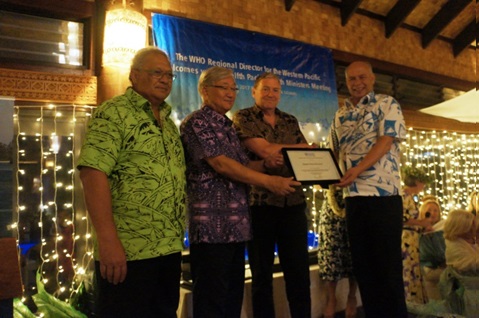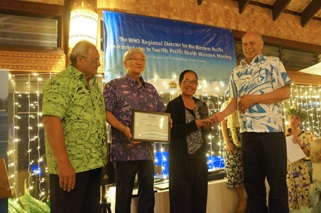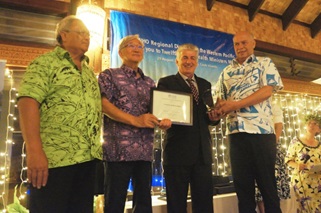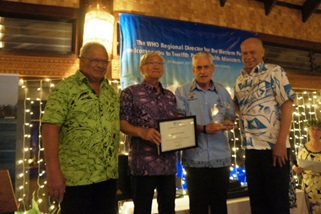The WHO Regional Director for the Western Pacific Region Dr Shin Young-soo, awarded four Healthy Island recognition awards to projects in the Federated States of Micronesia, French Polynesia, Guam and Fiji.
“The Healthy Islands recognition award scheme for health promotion projects started in 2011 to encourage innovation in ways of promoting and protecting the health of the Pacific people” said Dr Corinne Capuano, Director of Pacific Technical Support and WHO Representative to the South Pacific.
Supported by the Ministry of Health and Welfare of the Republic of Korea, the recognition scheme focuses on community-based actions, partnership efforts and governmental support for Healthy Island initiatives.
The 2017 awards were in two categories.
Best Proposal recognition
The recognition for Best Proposal is given for work proposed in the areas of community-based efforts or multi-sectoral engagement. The winner was:
- Operationalising Healthy Island Initiatives through ‘Provincial Health Model’ focusing on Provincial, District and Village levels. The proposal was submitted by the Naitasiri Provincial Council (Fiji). This proposal intends to utilise traditional structures to revitalise the Healthy Island concept at the provincial level. It will utilise a capacity building and needs assessment approach to support the implementation of agreed priorities.

Best Practice recognition
The recognition for Best Practice is given for work already in progress or recently completed in one or more of three areas: community-based efforts; multi-sectoral engagement; and governmental support. The winners were:
- Tongen Inepwinéú, Tongen Fénúwach (Love of the Family, Love of Our Islands) (Chuuk, Federated States of Micronesia). The proposal was submitted by Chuuk Women’s Council. The Council was established in 1984 as an NGO, and now has 64 groups across the state. They work collaboratively with government and other organisations to implement a range of health-related programmes. Their application focuses on their work on Building Resiliency to Climate Change through Family, Gardens, Food, and Health. This work has already reached 13,000 beneficiaries with evaluation showing improvements in knowledge and practice.
- Comité de prévention des Accidents sur la Voie Publique (French Polynesia): The proposal was submitted by the Committee for the prevention of accidents on the public roads in French Polynesia. It was established in 1999 in Moorea and includes community and government members who are committed to reducing road accidents and deaths. With ongoing careful evaluation and regular events targeting different groups (eg safe bicycling for schoolchildren) they have seen reductions in the number and severity of road accidents in Moorea.
- Increasing Breast Feeding on Guam through the Non-Communicable Disease Consortium (Guam). The proposal was submitted by the NCD Consortium in Guam in collaboration with the community, consumers, non-government organizations and government agencies. The consortium established a breastfeeding action team in 2011 which has focused on promoting improved breastfeeding practices. This including support for a Mother and Child Act which protected the rights of nursing mothers, support for establishment of breastfeeding rooms in various workplaces, annual campaigns and educational programmes and incorporation of breastfeeding promotion into other programmes. They continue to monitor the impact of their work.
WHO will continue to assist Pacific Islands Countries and Areas with innovation and community-based approaches through this biennial award and encourages the sharing of good practices.



